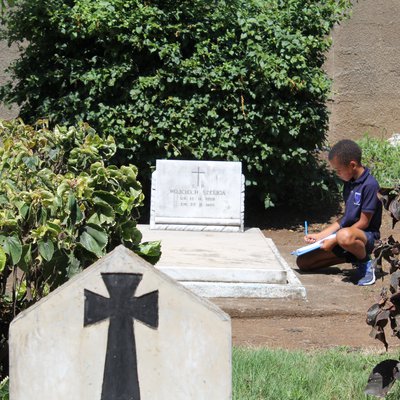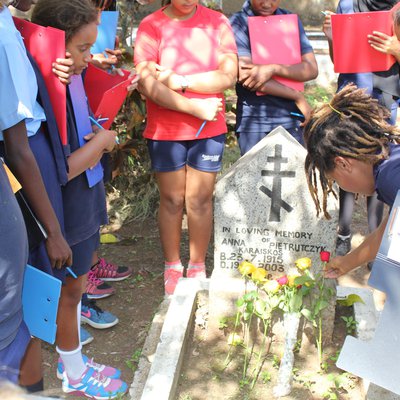Year 6 Visit the Polish Cemetery
5th February 2018
Year 6 have been immersed this term in WW2 History. Our text we are reading, “The Boy in Striped Pyjamas,” an extraordinary tale of friendship and war, led us to find out more about the plight of the Polish people.

Lo and behold, Tengeru, Arusha, harbours a Polish cemetery where 150 Polish refugees are buried. 5,000 refugees arrived here in 1942, escaping the terrors of war.
The children were fascinated to imagine and unravel some possible stories. Here are some of their reflections:
"I find it just amazing how these Polish refugees reached Tengeru. They are heroes to me. Can you imagine starting a journey in Warsaw, being expelled to Siberia then to Moscow, Uzbekistan, to Iraq, Iran, Pakistan, India and cramped in a boat to Kenya? Finally they arrived, exhausted in Tengeru. They survived diseases and starvation. They are heroes to me and I have a huge amount of respect for them." - Nicolas
"When I visited the cemetery and heard about the journeys around the world these Polish refugees made, it reminded me of my journey from Yemen to Tanzania, fleeing war.
It was late at night when the phone rang (It didn’t ring that often). My father picked up the phone, it was a deep voice and I couldn’t quite make out what was said. So I closed my eyes and went back to sleep. The next day I woke to hear anxious voices of my siblings. Someone was rushing, it was my eldest sister, Sumeiya, who came in and hugged me.
“We are going,” cried Sumeiya.
“Going where?” I asked
“To Kenya,” she replied.
With one bag each, we started our long bus journey……" - Kulthum
Imagine our surprise when we found out that Tiggy’s great grandmother was Polish and was buried in this cemetery. We gathered around the grave of Anna Karaiskos to lay flowers and pay our respects.

"Dear Anna,
Thanks for being here with us. I am happy you survived WW2 so that you live on in our memories. We are grateful for the enormous journey you made. I can’t imagine how you must have felt.
I love you, Tiggy xx"
Many graves were of babies who failed to survive even a day. With fathers at war, young mothers must have clung to the hope within them.
"Oh the torture.
Oh the hatred,
a long journey of sweat, strength and tears.
A mother looks down at her cradled baby,
Her only hope was the loved one she held in her arms.
A tragic loss she has to live with forever ." - Matilda
"When all hope is lost, it’s easy to give up.
These brave women fought death to save the light and life that grew within them.
And when that light dies, hope dies with it.
The light is gone and so is hope." - Tanvi
"I think the mother of Maria must have been very weak before giving birth.
Maria died the same day she was born.
Her mum also died that day.
She had escaped a POW camp; travelled thousands of miles, exhausted and hungry.
R.I.P, dear." - Belize.
"My eyes caught a grave that looked different from all the graves.
She had flowers that had grown on top of her.
As I sat and watched,
My heart started to smile,
Happy to see God was pleased.
R.I.P. " - Shreya
And finally a personal response from Ellis
"I honestly don’t know if I could cope without my family, not knowing where I was going or not being able to communicate. I honestly don’t know if I could do it. Could you?"
As part of his Gold Dragon Award, Nicolas carried out some incredible research in France, visiting places his great grandfather served in WW2. He interviews his great grandmother who shares her memories. Worth a watch!







